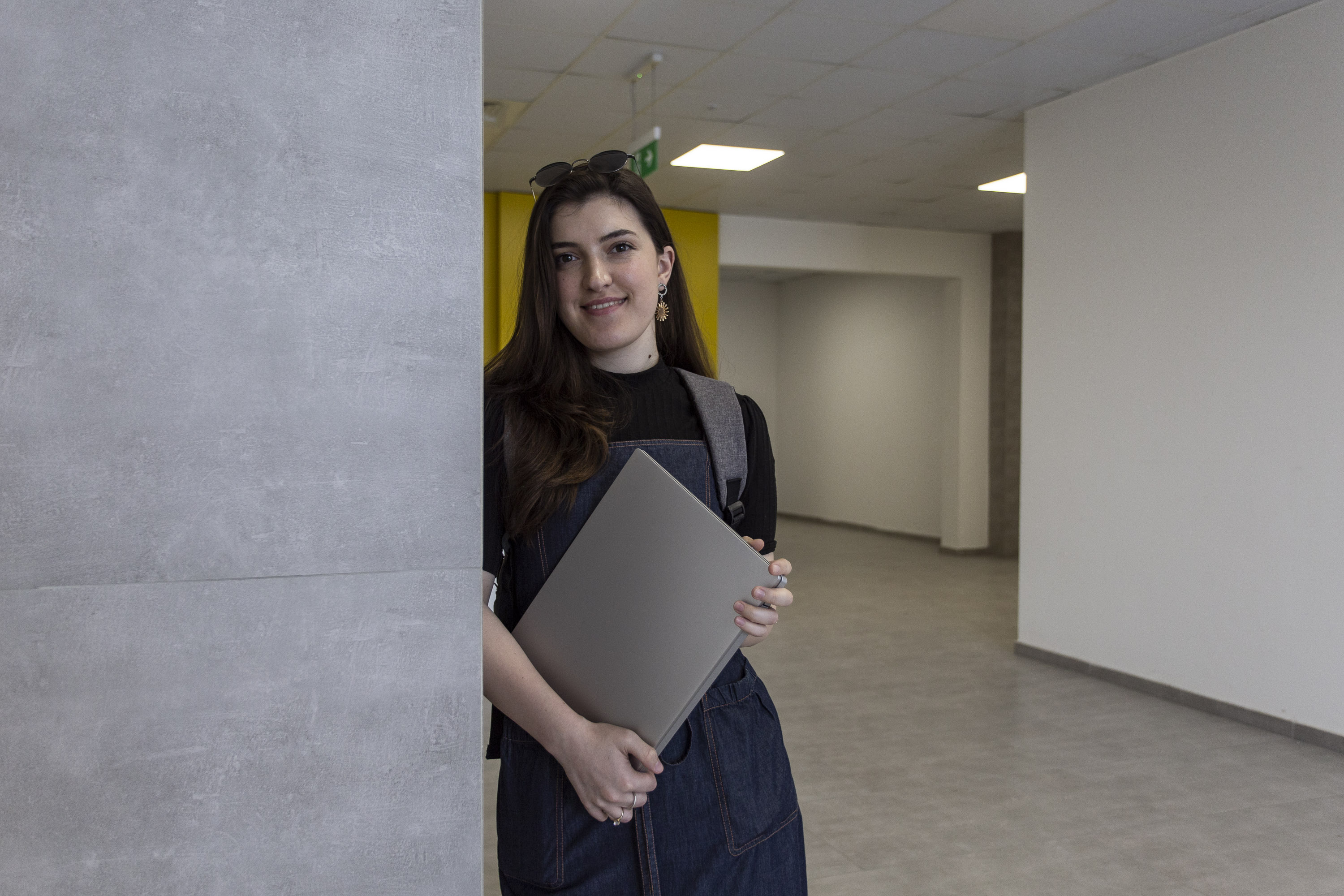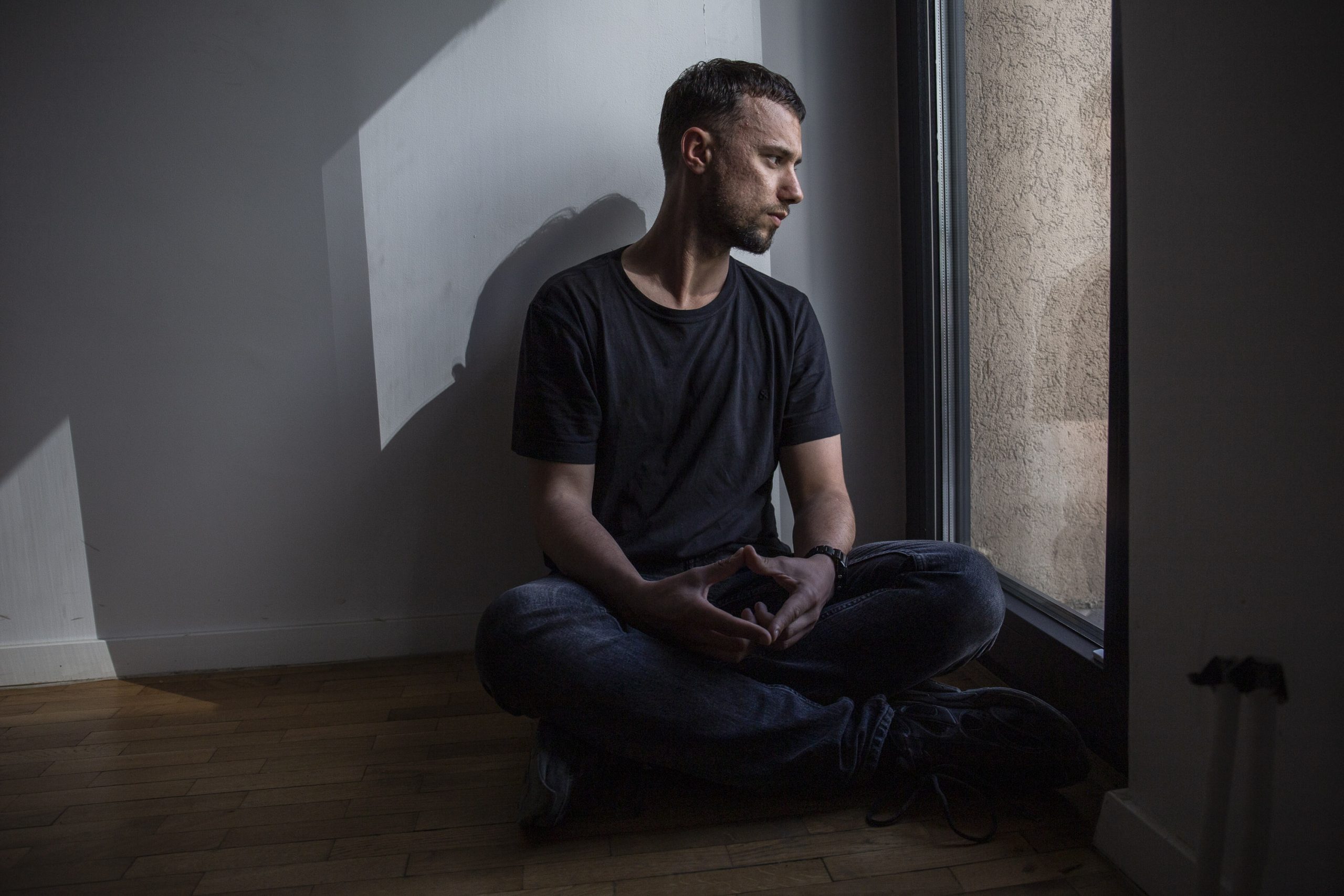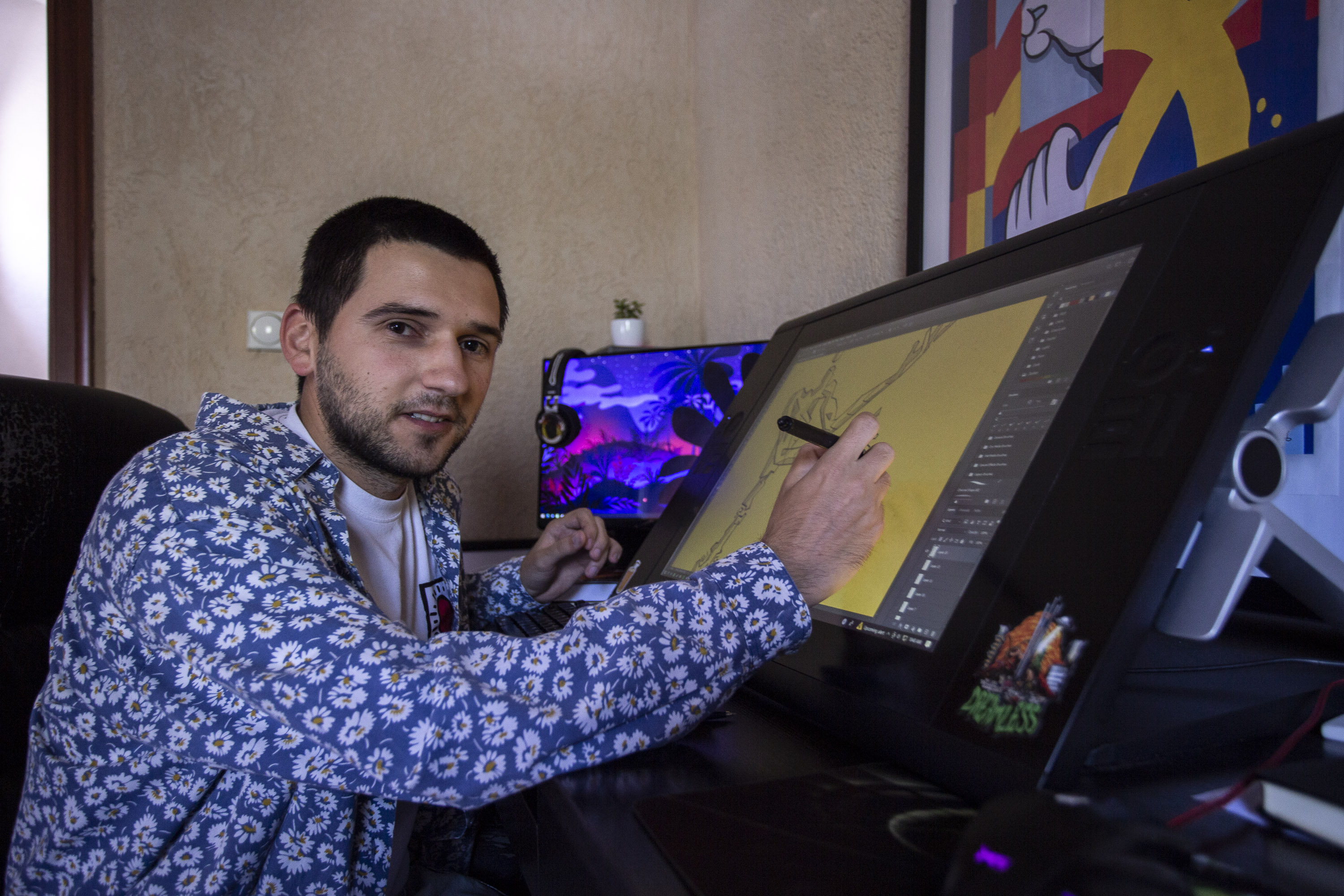
skilled youth find
opportunity abroad,
from home.
When Afërdita’s father was in his mid-twenties, roughly the age she is now, he was in Stuttgart, Germany, working any job he could find. A native of Bardh i Madh, a village near Prishtina, he had come of age in the early 1990s at a place and time when being a young Albanian man meant that your chances of making a decent living were grim.
An electrician by training, he was left with few choices but to flee his home and seek work abroad in order to improve the living conditions of his family in Kosovo. His early career trajectory resembles that of hundreds of thousands of Kosovar Albanian men during that decade who were forced by the oppressive Milošević regime to migrate to the European Union (EU) or elsewhere in order to find work.
There are still large numbers of Kosovars today who plan to leave the country, fleeing not oppression but dismal job prospects. Whether as doctors, engineers, construction workers, nurses, cooks or students, those who leave hope for a more prosperous future elsewhere.
But the rise of remote work worldwide means that though Kosovars still cannot travel abroad freely, there are more opportunities than ever for them to access global markets and jobs. A growing number of young workers in Kosovo have been making use of these digital avenues that allow them to make a decent living from home, at least for the time being.
We talked to four of them — each one at various points engaged in online freelance work — about the choices that led to their current careers, their reflections on the changing nature of online work, and how the ongoing shift fits with their visions of tomorrow.
Cracking the code
When deciding what to study after high school, Afërdita had one guiding principle: pick something with “a little bit more perspective.” Now a freelance software engineer working with partners in Germany, she remembers when as a teenager she first heard about the computer science department at the University of Prishtina and thought, “Okay, as long as it’s in high demand, I have to get in so I can find work.”
She’s been working as a freelancer since early 2022, after more than six years of experience with three different software companies, one of them Swiss and the other two U.S.-based with offices in Prishtina. The wealth gap between Kosovo and richer countries makes Kosovar tech professionals attractive for outsourcers who can pay these workers less than local standards in their own country, but significantly more than local standards in Kosovo.
It was during the pandemic, when Afërdita was working from home as a software engineer and team leader for a company based in Chicago, that she first thought of giving freelance work a shot.
“I noticed that while working from home, I had time to do other activities that I couldn’t do before when I was still going to the office,” she said. “And I think that’s when it occurred to me that working from home and having a lot of flexibility are some of the things that my profession can offer me.” She started responding to companies that were contacting her on LinkedIn and Xing, online professional networking platforms.

What presented an initial challenge for Afërdita was figuring out the legal and administrative side of things, which she did with the help of other freelance workers in the programming community. “In terms of taxes, I registered an individual business where I am the only employee since this was the advice I heard from everyone doing something similar,” she explained.
So far, she can’t think of a downside to her freelance work. For one thing, she says her income is much better than at any of her previous jobs, while she feels that she is freer to spend her time however she sees fit. “I decide when it’s time to complete my tasks and I can more or less organize my work around my life, around the other things I want to do,” she said.
Something else that’s different from before is the sense of ownership she feels in performing her day-to-day work. “You also feel ownership when you’re working as part of a team in a company, you don’t have to be working alone to feel it, but this is one of the first times that it’s happening for me,” she said. “I feel prouder with what I do — it’s quite fulfilling and it motivates me to work harder.”
Writing her own ticket
It’s that search for purpose that motivated Alma Feka to sign up on the freelancing website Upwork after she finished her master’s degree in management and informatics some years ago. Now working as a digital and innovation executive at a budding digital publishing company in Kosovo, the 27-year-old’s work history is a testament to her eagerness to wear many hats (she wore a gray beanie when we met).
Her first job was at the private university where she was doing her bachelor’s degree in information systems. The university was offering the degree for the first time that year, so she decided to try it out and it went well.
“I actually became a teaching assistant, unofficially. They called me a tutor since I hadn’t finished my degree yet, but I stepped in for my professors and did everything else a teaching assistant does,” she said. “But the job in itself wasn’t that amazing. There was a lot of commuting and the whole work process was a bit disorganized. I also wasn’t satisfied with my pay.”
She took a gap year after getting her bachelor’s degree, during which time she says she was fully invested in writing the script of a video game she was making with her brother. Then while doing her master’s, she worked as a German language teacher for some months, but soon felt that job was not fulfilling her broadening interests. Around that time, ads began to show up on her online feeds about Upwork and then “one thing led to another.”
Contracts
Many digital freelancers in Kosovo don’t work under long-term contracts and don’t have the protections they would provide. That means their international employers often don’t cover tax or pension contributions.
While some work in this informal manner, others have aligned their work with local laws. Some register themselves as a company with a single employee, themself, at the Administration of Taxes of Kosovo (ATK) and pay their own taxes. Others link up with newly found companies that take care of these obligations in return for a monthly fee.
Setting up an account was complicated because Kosovo is not integrated in the online payment service Paypal. Once she crossed that barrier, using “credit cards and documents and whatnot,” she continued working as a freelance copywriter and translator for four years.
Her clients from the U.S., Canada, Germany and elsewhere seemed to like her work, so she decided to keep working as a freelancer “until something better comes along.”
When two opportunities came along after four years into her freelancing career, she had a difficult choice to make. One was at the Kosovo Intelligence Agency (AKI), where she applied for an open position and passed the first test, and the other at a growing tech start-up where she went for an interview as a copywriter.
“I was in a dilemma. Should I go for AKI, [where I can get] a secure job working for the state, or do I want to continue with this other journey that might turn out more creative and fulfilling?”
She went for the tech start-up.
Connecting the dots
Arvan Berisha, 29, started working in the marketing industry when he was a 19-year-old student of graphic design at the University of Prishtina. In the next few years he switched agencies as he was learning the craft, until at the age of 24 he won a grant from the Kosovo Cinematography Center to create an animated movie and decided to focus all of his attention on the film.
“That project was like plunging into the river when you don’t know how to swim — so I had to learn how to swim and my project lasted five years,” he said. “My budget was spent because I had asked for less than I [needed], so I started taking on work as a freelancer quite spontaneously.”
From then on he didn’t think of going back to working for someone else because, “I was earning more than anywhere I had worked before, or even than other people who might have been doing a better job than me but were working at a company rather than freelancing.”
His plan was to target local marketing agencies, many of which he had cooperated with previously as part of a team. His already established network along with his skills led him to projects that were beneficial not only materially, but offered him creative freedom and the satisfaction that comes from professional quality. “Clients used to call me and ask for my solution,” he said. “It was perfect, the exact opposite of what designers usually complain about.”
Arvan attributes aspects of his success to good fortune; he started his first job in what he calls the “crème de la crème” of marketing agencies. He also considers himself lucky to have as his profession a grown-up version of what he used to do since he was a little kid: draw on any surface he had in front of him.
In his freelance work he was able to tap into a niche market that boosted his prospects. “I think I sensed in the market an area that no one had covered until then. They call it alegria illustrations, the visual communication that digital companies started, Facebook first and then the others,” he explained. “I caught it [at the right time] and then the demand for that style of communication started growing, so agencies kept offering me projects I was so happy to work on.”

At 26 he accepted an offer from an agency in Norway to cooperate on longer-term design projects as a remote freelance worker. It was going alright at first, working with them while also engaging in projects with other clients locally, that is, until life gave him a lesson on setting boundaries.
“My self-esteem increased when I saw that I can also work internationally, but [then my client] decided to break the contract, all because I got in too deep,” he said. “I got too ambitious and didn’t know how to organize my work, didn’t know how to say no to anyone and then got lost in that dynamic.”
While he still feels regret about losing a job that paid so well with relatively little stress, things are turning out okay regardless. For a couple of years he continued working with local agencies, until 2020 when the creative social media platform Behance, where he showcases his work, created a new feature to be able to apply directly for jobs. That’s how he connected with two clients, in Sweden and Singapore, with which he signed long-term contracts. The individual business he created in 2018 to be able to conduct his freelance work legally has now turned into an agency employing another two young designers who are gathering work experience like Arvan did in his turn.
This type of learning by doing seems extra useful for young professionals in creative fields, where traditional methods of higher education have trouble keeping up with innovations in the sector.
Back to the drawing board
Illustrator and animator Edvin Susuri first decided to give freelancing a go in his early twenties after working for a year as a full-time unpaid intern and then four months of paid work at a design agency. During his initial attempt at freelancing he said he “successfully failed” because of a whole set of reasons, chiefly his lack of experience and network.
“Nobody knew me — I was the new guy and not many people trusted me with the job because I was very young,” he said, reflecting back after a number of years. “I continued for almost half a year because I did get some jobs initially but since I didn’t know how contracts work, I never wrote them and relied on word of mouth, which is quite a bad thing because you need to have at least an invoice but I didn’t have an individual business or anything.”
He refers to the whole stint as a mistake born out of inexperience, but thinks it’s good that it happened when it did because it gave him a chance to push himself to get better at his job technically, but also at the social and practical aspects of work. “For the next six or seven years,” he said, “I went back to being employed by others during which time I learned a lot of things and [got rid of] that ego you tend to have at a young age where you think ‘I’m the best,’ because I got humbled by people who were much better.”
Youth unemployment
Kosovo has the youngest population in Europe, and this age cohort has some of the highest unemployment rates. Roughly 48% of Kosovars ages 15-24 are unemployed, as are 31% of those 25-34. Unemployed Kosovars in the 15-24 age range make up a third of the country’s unemployed people.
While many of the Kosovars doing well in the online international freelance sector are young, this work is only suitable for people with a specific skill set. Many unemployed young Kosovars don’t have the technical skills or abilities to get work in the digital realm and must contend with a grim local job market.
During that time he worked with a number of people in the industry, which helped him with connections once he returned to freelancing last year. This sort of professional networking over the years helped Edvin find new work and clients, which has been especially helpful given that he doesn’t have an online portfolio for prospective clients to peruse.
“It’s weird because [an online portfolio] is necessary,” he admitted. “I have to do it soon, I can’t keep going just with the people who know me because I have to find new clients, new work… When you’re a freelancer you need that extra push.”
He got an extra push at the end of last year, when an acquaintance put him in contact with a tech company in Miami that was looking for an artist to create the visuals for a collection of non-fungible tokens (NFT), digital art products tied to blockchain technology, that they could give as gifts to people who invested in the company. Edvin accepted their offer even though he hadn’t worked on NFTs before and didn’t know how they worked.
Using the same analogy as Arvan, he explains the process as learning how to swim after being thrown into deep water. “I learned as I went along and ended up generating an NFT collection,” he said. Since the NFT collectible characters he created were not meant to be sold by the client in Miami, he got paid just once, rather than receiving a royalty payment each time an NFT is sold, as many artists for NFTs try to have their contracts stipulate.
“I talked to some people who are more involved with crypto stuff and they told me, ‘okay, let’s create a team: you find another artist to create them, then let’s make a lot and sell them,'” he said. Their NFTs went live and started selling in January 2022 and he has been happy with the results, though global sales of NFTs have declined precipitously in the last few months.
But he’s hopeful that his artistic labors will continue to reap rewards. In the meanwhile he’s enjoying the process of creative growth and the new skills he’s learning along with other artists in his circle.

What’s waiting in the wings
All four of these professionals call on the same language when describing the aspects of freelance work in the digital sphere that appeal most to them. Independence, good pay, flexibility, creative freedom, a strong sense of ownership and a huge potential for growth are one side of the coin — a lack of stability and the potential for isolation and burnout on the other.
Still, whether they’re relatively new to it like Afërdita and Edvin or well-versed like Alma and Arvan, they’ve all been making use of digital freelancing as a springboard to realize their individual goals.
For Alma, freelancing offered a steady income and the opportunity to develop a wide array of professional skills, which she used to figure out what she enjoys doing and cultivate the skills needed for seeking conventional employment.
But working from 10 to 6 everyday on a fixed schedule has some costs; some days she’s too tired after work to pursue personal interests, like the blog she recently started. But on those days she reminds herself that her job is a stepping stone.
“I see work as a tool to achieve more in life,” she said. “I always think that I might not be in this company my whole life, so I try to extract all the knowledge I can and to apply it in my personal projects and generally in life.”
For Edvin, the first stint of freelancing years ago offered him lessons in humbleness and the value of experience. This time around it’s helping him explore with an open mind brand-new technologies while he pushes himself to get out of his creative comfort zone.
“I’ve never dealt with crypto before so [this recent] experience is eye-opening and the best thing is that I found a lot of good artists I normally wouldn’t have and I found inspiration in them,” he said. “I can’t think of anything negative about the whole experience.”
Arvan is now trying to make the most of his new role as the leader of a creative team competing on the global market. “I think this is the way to go from now on, not as a freelancer but as an agency providing services to digital companies because they have the potential to grow and you can grow with them.”
As for Afërdita, she is taking some time to settle into working with a new set of people before taking on new projects to challenge herself and grow professionally. As a self-described people-person, one of the things she likes most in her work as a freelancer is that she gets to collaborate with people from diverse cultures, which she sees as an opportunity for personal growth as well.
In fact, that’s one of the main reasons why she’s decided to continue her journey in Germany, in a city further north than the one from where her dad returned almost 30 years ago. Unlike him, she’s not going out of a need for safety and security but for self-actualization.
